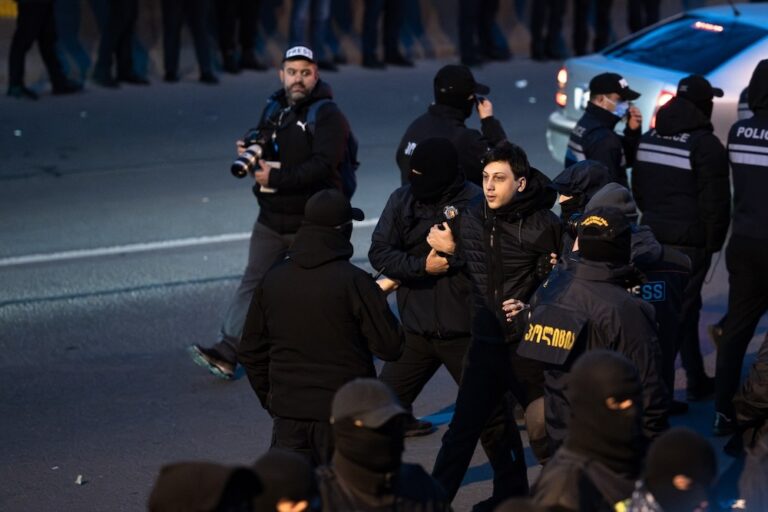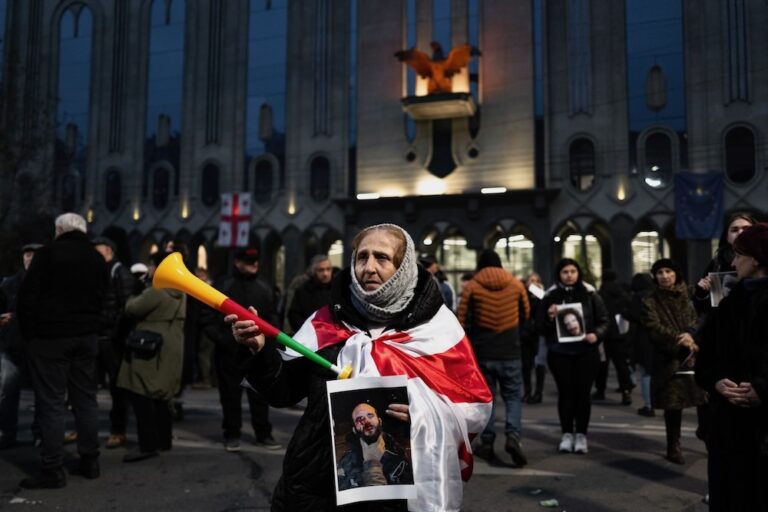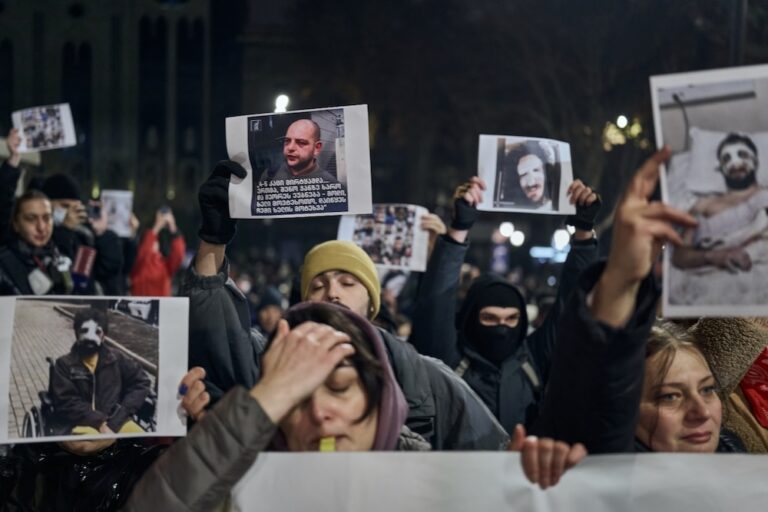(RSF/IFEX) – On 5 March 2004, television journalist Vakhtang Komakhidze was brutally beaten in the latest of a dozen incidents of harassment of the media in the autonomous republic of Ajaria that have occurred to date in 2004. His assailants were identified by a witness as belonging to the Ajarian special forces. RSF has called […]
(RSF/IFEX) – On 5 March 2004, television journalist Vakhtang Komakhidze was brutally beaten in the latest of a dozen incidents of harassment of the media in the autonomous republic of Ajaria that have occurred to date in 2004. His assailants were identified by a witness as belonging to the Ajarian special forces.
RSF has called for a halt to the ongoing harassment. “The authorities in Ajaria republic must stop obstructing the work of the media in the region and take strong action against those who use violence against journalists,” the organisation said.
The attack on Komakhidze, of the “60 Minutes” programme, which airs on the privately-owned television station Rustavi 2, came after he was pulled over by police as he was driving out of the town of Khelvachauri in the company of another journalist, Mzia Amaglobeli.
Several black-clad men jumped on him, beat him and seized equipment and documents from both journalists. The police did nothing to stop the attack.
Amaglobeli, of the Ajarian weekly “Batumelebi”, who was not attacked, recognised the assailants as members of a special Ajarian service responsible for putting down demonstrations.
Komakhidze had been researching a report on alleged corruption by Ajarian President Aslan Abashidze and his family. The previous evening, his cameraman, Dimitri Miasnikov, was arrested and questioned by police in Batumi, the republic’s principal city.
RSF has registered approximately a dozen incidents of harassment so far this year.
The authorities banned the television stations Rustavi 2 and Imedi from working in the region and in two months, five journalists have been physically assaulted and five others arrested. The security forces have done everything possible to prevent the press from covering demonstrations against the president of the republic, who is an opponent of Georgian President Mikhaïl Saakashvili, the organisation said. RSF urged President Saakashvili to act quickly if the local authorities fail to take the necessary action.
On 4 March, Rustavi 2 cameraman Miasnikov was arrested in Batumi. He was held for one hour in the offices of the Interior Ministry while police deleted footage he had taken for “60 Minutes”.
On 20 February, at a demonstration against President Abashidze in Batumi, counter-demonstrators attacked television journalists who were covering the story. Ramaz Jorbenadze, a cameraman for Channel 9, was assaulted. Nato Imedaishvili, his colleague Diana Trapaidze and Irakli Kifiani of the private station Imedi, together with Nestan Checkhladze and David Maisuradze of Rustavi 2, were all targeted by the counter-demonstrators and forced to hand over film they had just shot. The demonstrators also threatened to ransack the offices of the weekly “Batumelebi”.
On 28 January, four armed men burst into the Batumi home of David Gogitauri, a cameraman for Imedi. They beat him and threatened further reprisals unless he stopped covering political events in Ajaria. They also seized a filmed interview with the mayor of Batumi and son of Aslan Abashidze, Giorgi Abashidze.
On 13 January, the same journalist was the victim of an attack by about 15 unidentified assailants, as he was about to interview a man who had been beaten after hanging the traditional Georgian flag from his window. The flag is a symbol of President Saakashvili’s National Movement Party.
On 25 January, police targeted Eter Turadze and Amaglobeli of “Batumelebi” during a demonstration against the local government in Batumi. They seized and destroyed their equipment. The two journalists had previously been beaten on 11 January by a gang of about 15 black-clad men as they covered a demonstration in support of Saakashvili in the village of Gonio. The attackers also seized and damaged their equipment.
On 10 January, police in Batumi roughed up Trapaidze and Checkhladze when they filmed them in the act of ripping up posters of the Kmara movement. Police accused the journalists of promoting the movement that headed the “Rose Revolution”. Police also beat Tedo Jorbenadze, of “Batumelebi”. All three journalists were held for nearly one hour.
Finally, on 7 and 8 January, the authorities prevented Rustavi 2 journalist Irakli Shetciruli from crossing the republic’s administrative border at Choloki.


